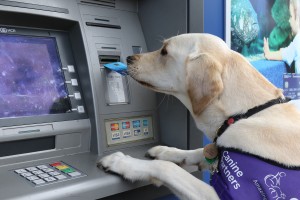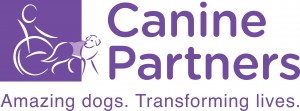Today we have a special 7 Questions with a charity that you probably haven’t heard of, but should have, @canine_partners. Hopefully this will help.
1. What is Canine Partners?
Canine Partners is a national charity that trains dogs to help disabled people by performing a range of tasks that the rest of us take for granted. These can range from picking up dropped items to undressing their owner! They can even take a credit card and money from a cash machine, although they can’t put the pin number in. Perhaps just as well, otherwise they might be off down the pet shop to buy supplies! They can certainly take items from supermarket shelves and hand a purse to the cashier!
2. What is involved in training a canine partner?
To train a canine partner takes the best part of the first two years of the dog’s life. They begin as eight-week-old puppies, living with a volunteer called a puppy parent! That’s a very apt title for someone who basically housetrains the puppy, takes them everywhere to get them socialised, teaches them right from wrong (using the right commands for actions such as touching, tugging and retrieving), and brings them to school … or puppy class as it is called. When the dog is about 14 months old and has completed the puppy training he will go to big school, or advanced training, at one of the Charity’s special centres. There he will learn the more advanced tasks such as unloading a washing machine, opening doors and retrieving a phone, and will also meet his future disabled owner. At the end of the five months advanced taskwork training the dog and the applicants with whom he has been paired, spend two weeks on a residential course. This is for the disabled person to learn how to work with his new canine partner … the dog is already fully trained by then!
3. Who qualifies for a canine partner?
The dogs are trained to assist someone with a physical disability or who has a mobility problem that affects their everyday life and who would benefit from a special dog performing a variety of household tasks for them. Very often people with physical disabilities struggle with pain and fatigue due to the effort of doing even simple things like picking up something that has dropped or opening a door. Having a canine partner beside them who can do all those tasks for them means their pain level and fatigue is reduced, and often this means they don’t need as much medication. So perhaps canine partenrs should be on the NHS!

4. How can people get involved and help?
As the Charity doesn’t receive any government funding they rely on the generosity of the public to give donations to further their work. People can help by undertaking any fundraising activity – it doesn’t matter how small. Bake sales, sponsored walks, skydives, challenge events … all of these activities can raise funds. Maybe even grow a sponsored beard for a year!! Or try nominating the organisation as a charity of the year at your workplace. Canine Partners also relies on volunteers so people can give their time to the Charity: for example, if they don’t work and would like to be actively involved with training the dogs, they could volunteer as a puppy parent. These people take the young puppies into their homes for a year or so and, under the guidance of trained staff, they teach the pups basic obedience and core activities that will then develop into the taskwork that will one day help a disabled person. Not only are you contributing to a dog that will make a difference to someone but you get to have a cute puppy for a year! The Charity also has a network of volunteer speakers who, after undergoing some training, give talks to groups and organisations helping to spread awareness. It’s a great way to meet people too!
5. Where do you stand on the topic of pet couture?
Not quite sure what is meant by this question! We encourage our puppy parents and partners who are paired with our trained dogs to actively groom their dogs as that helps build the bond which will be so important, while keeping the dog looking the best it can. The dogs wear their purple jackets announcing that they are assistance dogs when they are out and on duty, so they always look very smart!
6. We have many dog readers, some of whom might like to become a canine partner, what type of dog do you need to be?
To be a canine partner you need to be a dog that enjoys being with people, that loves retrieving items and picking up items that are dropped on the floor over and over again, and enjoys learning new things. You will probably be a Labrador, or golden retriever, or a mixture of both. You might be part poodle, for intelligence! You will be young as you will be expected to be a fully trained canine partner for many years, and you will just revel in being in the limelight as canine partners do become local celebrities when they are partnered with a disabled person. Finally, you will be the most wonderful assistant, friend and companion to someone who relies on you for their confidence and independence. What a great life!
7. Where can people find out more?
If all of the above has whetted your interest in Canine Partners, then please visit with website: www.caninepartners.org.uk, check out their Facebook page or follow them on Twitter. Finally please do tell all your friends about how amazing these dogs are and their life-transforming role for people with disabilities.
And if you would like to answer 7 questions then get in touch


